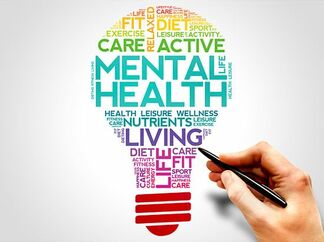|
Research has proven time and time again that the benefits of improved mental health are numerous and have far-reaching effects. Benefits associated with emotional and psychological wellness include work productivity, employment and housing stability, positive social and family relationships, improved physical health, educational achievement, and greater life satisfaction.
Here are 10 tips that will help you integrate mental health into your every day life this year: 1. Get more sleep: Sleep deprivation has been linked to an increase in depression. Experts note that consistently sleeping 7-8 hours per night is best practice, as well as having a consistent bedtime and awake time, even on the weekends. 2. Exercise more: Fuse your fitness health goals with your mental health goals by engaging in more physical activity. Several research studies have found that exercise is as effective as an antidepressant, capable of relieving mild to moderate depression and can also contribute to better sleep. 3. Get a hobby: Extracurricular activities can help promote a sense of pleasure while also building mastery in something; both of these contribute to overall mental health. 4. Take a break from social media: Recent studies have shown that social media feeds can lead to feelings of anxiety and depression due to the constant comparison to others that naturally follows. Taking a break from social media platforms can help you realize that you don’t have to live a life of comparison and that doing so can impact your mental health. 5. Meditate: Research suggests that meditation can reduce stress levels and help you be more effective in getting things done. Mobile applications such as Headspace, The Mindfulness App and 10% Happier can help you dedicate 10 minutes a day to clearing your mind, which can result in long-lasting mental health benefits. 6. Get a planner: Avoid overbooking yourself and procrastinating on completing tasks. Using a planner can help you better organize your schedule, check things off, and have a better sense of accomplishment. This will reduce the anxiety that comes with having too much to do with such little time. 7. Start journaling: Discharging your worries by writing them down can help reduce rumination. Rumination is the process of thinking obsessively about negative occurrences, feelings or emotions, which is often linked to anxiety and depression. 8. Help others: Prosociality, connecting with and to others, is the single strongest predictor of happiness according to social science research. Helping others is a great way to connect to people in the community. Try volunteering or offering assistance to those who are in need. 9. Be grateful: Studies show that one of the simplest ways to feel happier is to practice gratitude by reflecting on the good things in your life. Keeping a gratitude journal or saying something you are grateful for out loud at the end of every day can help increase your life satisfaction. 10. Be nicer to yourself: Give yourself a break! Do not expect changes to happen overnight and avoid asking too much of yourself. Instead of making a long list of things you want to do differently, focus on starting with two or three things. Celebrate your successes and do not beat yourself up when you make mistakes. Just pick yourself back up and keep trying your best! Source: https://health.usnews.com/wellness/mind/slideshows/10-new-years-resolutions-for-better-mental-health
1 Comment
3/27/2023 02:25:29 pm
I like how you talked about how you should give yourself a break when you are trying to improve your mental health. I would think that a lot of people are ashamed to reach out for help and try to tackle their mental health on their own. Reaching out to medical professionals could be a good way to give yourself a break when you are handling your mental health.
Reply
Leave a Reply. |
AuthorWrite something about yourself. No need to be fancy, just an overview. Archives
June 2024
Categories |


 RSS Feed
RSS Feed
